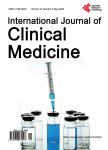The Impact of Thiamine Treatment on Generalized Anxiety Disorder
作者机构:Vietnamese American Medical Research FoundationWestminsterUSA
出 版 物:《International Journal of Clinical Medicine》 (临床医学国际期刊(英文))
年 卷 期:2011年第2卷第4期
页 面:439-443页
学科分类:1002[医学-临床医学] 100214[医学-肿瘤学] 10[医学]
主 题:Thiamine General Anxiety Disorder Vitamin B_(1) Anxiety
摘 要:Objective: Patients with generalized anxiety disorder (GAD) are fearful. They constantly worried about minor matters, and they anticipate the worst. The GAD is diagnosed when a patient experiences excessive anxiety and worry for at least 6 months. The cause of GAD is unknown. In the present paper, we discuss patients with GAD who have low levels of thiamine in their bloods. We also discuss the role of thiamine in the pathogenesis and treatment of GAD. Methods: We examined 9 patients (6 males and 3 females) who met the DSM-IV-TR diagnostic criteria for GAD. These patients had no history of alcoholism. Their ages ranged from 57 to 83 years old (mean age –72.8 ± 2.9 years). All of the patients had low blood thiamine levels (mean –25.1 nmol/L ± 6.0 nmol/L;normal level—70 nmol/L - 180 nmol/L). Participants completed the Hamilton Anxiety Rating Scale (HARS) for anxiety before and after thiamine treatments. All of the patients received daily thiamine 100 mg intramuscularly. Results: Thiamine supplementation significantly improved HARS scores, increased both appetite and general well-being, and reduced fatigue in patients with GAD. Interestingly, these patients were able to discontinue taking anxiolytic and β-blocker medications. Conclusion: Parental thiamine significantly affects patients with GAD.



